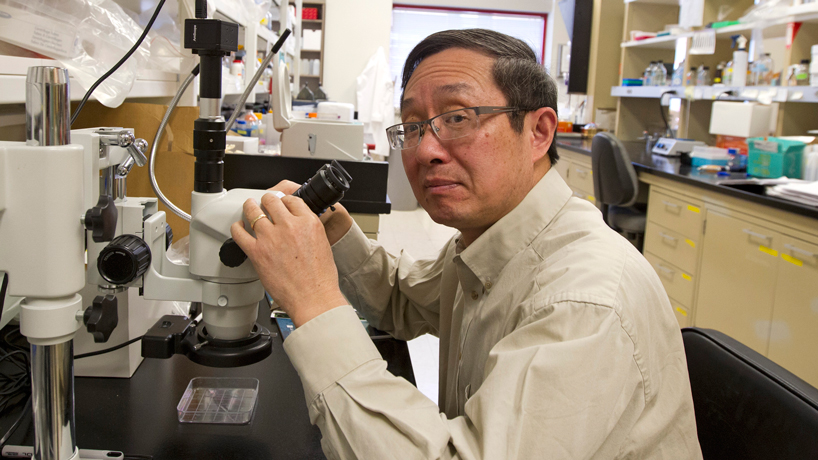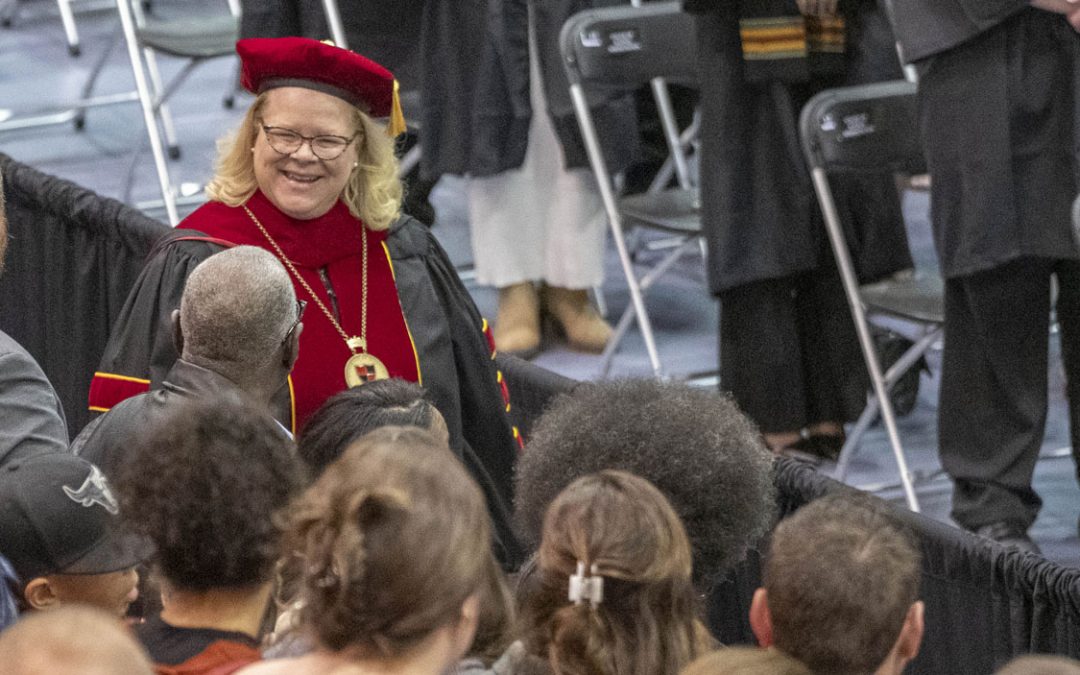
The National Institute of General Medical Science awarded Xuemin (Sam) Wang and co-principal investigator Dmitri Nusino $1,209,399 for their proposal, “Unraveling the molecular connections that link circadian rhythms and lipid metabolism.” (Photo by August Jennewein)
When Xuemin (Sam) Wang visits his family, who live near the city of Wuhan in China, he notices how much more he eats for breakfast there than when he’s at his home in St. Louis.
He’d occasionally think that maybe breakfast is just better in China.
But the E. Desmond Lee and Family Fund Endowed Professor in the Department of Biology at the University of Missouri–St. Louis knows the real reason behind his sudden appreciation for the morning meal: jet lag.
“When I started working on clock function, I figured out that actually when I get there, the morning is the evening of St. Louis time,” he said. “That’s right, it is my dinner time, and for dinner, I usually eat a bunch more than at breakfast. There’s a mismatch between your internal clock with the external environment.”
Despite the strength of our circadian rhythms, our bodies’ sense of internal time can be changed. One method to alter clock function is through metabolism, and there have been studies demonstrating the impact of feeding time and high fat diets.
Yet, not much is known about the mechanism behind how metabolism affects clock function. Wang hopes to change that.
In March, the National Institute of General Medical Science awarded Wang and co-principal investigator Dmitri Nusinow – an associate member of the Donald Danforth Plant Science Center, where Wang also holds an appointment – $1,209,399 for their proposal, “Unraveling the molecular connections that link circadian rhythms and lipid metabolism.”
Through their research, they hope to discover the molecular mechanism of interplays between the circadian clock and lipid metabolism through what might seem to be an unexpected medium: plants. Specifically, they’re studying Arabidopsis thaliana, a tiny and fast-growing member of the mustard family that’s often used in plant biology research because of its rapid lifecycle and small genome, which can be easily manipulated.
“By understanding this kind of reciprocal regulation, particularly how the lipid metabolite can actually impact the clock function, we may be able to better understand how we can mitigate this mismatch between our internal rhythm and our external environment,” Wang said.
Using plants to unravel the mysteries of mammalian or human health might seem unlikely, but the two have analogous systems.
Though it’s not the exact same system as humans, plants have key transcription factors, which are proteins that bind to DNA and can turn genes on or off, regulating circadian clock functions.
Wang is examining the interaction between phosphatidic acid or PA, a central glycerolipid metabolic intermediate, and key circadian clock transcription factors.
The ultimate goal is to understand the regulatory mechanisms for the circadian clock and lipid metabolism and the interplay between the two. Wang believes it might have far-reaching implications for human health because PA is also involved with lipid metabolism and potentially with clock regulation in mammals.
“There’s a lot of attraction to it because in humans when you have this misalignment, there are metabolic dysfunctions, such as obesity and diabetic conditions, that are associated with perturbation of lipids metabolism,” Wang said. “One of the aims of the grant is to figure out how this mismatch can cause accumulation of the lipids in different directions.”
This new focus is backed by the plant lipid research that Wang has done throughout his years as a plant biochemist. The son of an agronomist, Wang started his academic career as a soybean breeder at The Ohio State University. He became interested in gene manipulation in plants, then with how genes work and the function of metabolic and regulatory pathways.
That led him to earn his MS at The Ohio State University and PhD at the University of Kentucky. He became a professor of biochemistry for 13 years at the Kansas State University before coming to UMSL in 2004.
Though Wang’s research has been supported by the U.S. Department of Agriculture, the Department of Energy, and the National Science Foundation, this is his first proposal funded by the National Institutes of Health and the first time he’s delved into work that has implications for human health.
“I was very excited that now we could have resources to pursue the directions we want to pursue,” he said. “The way you know that the idea is actually good or recognized by a panel of experts– that is a humbling experience. We’re working on plants, and the NIH recognizes the value. We can pursue a test for that hypothesis we have – that makes us very excited, too.”














